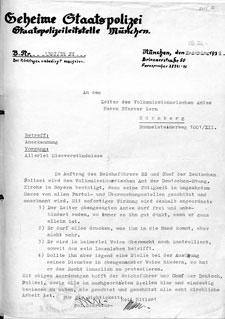Helmut Kern: Ridiculing the Gestapo
Despite his staunchly nationalistic and even anti-Semitic views, Pastor Helmut Kern (1892–1941) evolved into one of National Socialism’s staunchest opponents and was constantly in conflict with the Gestapo from 1936 onward.
After returning highly decorated from World War I and fighting in the Freikorps Epp against the Munich Soviet Republic in 1919, Kern became a pastor in Schwarzach near Kulmbach in 1923 and mission inspector of the Association for Home and Foreign Mission in Neuendettelsau in 1928.
In “home mission”, Kern was supposed to win back individuals estranged from the faith, dispute ideological opponents and train other home missionaries. Kern devoted himself to this work with great zeal and was able to look back on a job well done when he became the pastor in Göggingen near Augsburg in September of 1933.
After briefly joining the German Christians, whom he abandoned in the wake of the Sportpalast scandal in November 1933, Kern became a close confidant of Regional Bishop Hans Meiser (1881-1956), whom he backed unconditionally in the church’s impending political conflicts (i.e. Meiser’s detention in the fall of 1934 and the fight against non-denominational schools in 1936).
On October 25, 1933, Kern was appointed the regional church’s special representative for church renewal. As of August 1935, he headed the church’s Home Mission Agency in Nuremberg. In addition to traveling and lecturing incessantly, the mainstays of Kern’s home mission work were organizing events for young people and writing a multitude of brochures with large print runs.
His pamphlet Mein Deutschland – wohin? (My Germany – Whither?), published in 1937 – the second edition of which was entitled Kirchenkampf wie lange noch? (Kirchenkampf How Much Longer?) – especially prompted the Gestapo to obstruct Kern’s work severely and to place him under a nationwide speaking ban in June of 1937 for maligning the government and the party. At the same time, proceedings were opened against him for violating the Treachery Act.
In his pamphlet, Kern had defined the entire history of the church as a Kirchenkampf, as a clash between God and Satan. Based on this interpretation of history, Kern described the period of 1918 to 1933 as an all-out war against God, the years 1933 to 1936 as an ecclesiastical revolution and the years 1936 to 1937 as an all-out war against Christ and His church.
Several of Kern’s brochures and pamphlets were confiscated in the ensuing period. This presumably prompted the forged letter of February of 1939, which ridiculed the Gestapo.
Kern was transferred to Nördlingen as a dean in December of 1938 for his own protection. Although this did not deter him from further dissident actions, he considered this step taken by the church government without his consent to be a severe reversal and degradation.
After the outbreak of the war, Kern was a military chaplain at first. Since he was classified as politically unreliable, though, he was sent back to Nördlingen. He then enlisted in the Wehrmacht and fought in the French, Balkan and Russian campaigns as a highly decorated company commander. Kern was wounded in September of 1941 and died in Bucharest on December 16, 1941.
Source / title
- © Landeskirchliches Archiv Nürnberg, KKE Nr. 33

